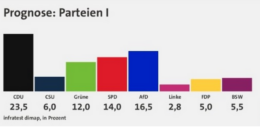The estimates that wanted the hard right on the rise in Europe, with upward trends even in major countries, are confirmed by the first results based on the exit polls.
The Ifop Fiducial exit poll in France places Marine Le Pen’s party at 32.4%, with Macron’s party at just 15.2%.
Following are the Socialists at 14.3%, Jean-Luc Mélenchon’s Unsubmissive France at 8.3%, the center-right Republicans at 7%, and the Greens at 5.6%. Around 5.1% is received by Éric Zemmour’s party.
France, Ifop Fiducial exit poll:
European Parliament election
RN-ID: 32,4%
Bd’E-RE: 15.2%
Rl’E-S&D: 14.3%
LFI-LEFT: 8.3%
LR-EPP: 7.0%
LÉ-G/EFA: 5.6%
REC-ECR: 5.1%
…Special election page: https://t.co/1An2baUJmP #ElectionsEuropéennes2024 #EP2024 pic.twitter.com/DW6p162kap
— Europe Elects (@EuropeElects) June 9, 2024
Participation is estimated at around 52.5% of the electorate, marking the highest turnout in European elections in the last 30 years in France.
In the European elections of 2019, Marine Le Pen’s party came first again with 23.31% compared to 22.41% for Macron’s coalition. The Greens took the third position with 13.47%, the Republicans fourth with 8.48%, Unsubmissive France fifth with 6.31%, and the Socialists seventh with 6.19%. The remaining parties did not exceed the 5% threshold and therefore did not elect a Member of the European Parliament according to French electoral law.
Particularly important are the results from Germany where the exit poll confirms the opinion polls that put Olaf Solz’s Social Democrats in third place.
The CDU has already directly raised the question of the legitimacy of the government – it is time for a “fresh start”, it stresses.

Exit polls in Germany place Chancellor Olaf Scholz’s Social Democrats in third position, confirming the party’s significant decline in the polls for over a year.
European Election Results
The Christian Democratic Union/Christian Social Union (CDU/CSU) alliance is expected to take the first place in the European elections according to exit polls in Germany, with a percentage of 29.5%. The AfD follows with 16.5%, surpassing the Social Democrats (SPD) at 14%, and the Greens, who are struggling, dropping to 12%.
In the previous European elections in 2019, the percentages were: CDU/CSU 28.9%, Greens 20.5%, SPD 15.8%, and AfD 11.0%. It is evident that the radical right-wing party AfD (Alternative for Germany) has experienced the most significant rise. The party has been marginalized even by “sister” European parties such as Marine Le Pen’s National Rally in France.
Compared to the 2019 European elections, the AfD increased its percentage by 5.5% (according to exit polls). This is a significant success for the party, which has been hit by scandals and issues involving corruption and espionage in recent months, as reported by Politico.
Meanwhile, the results for the Greens are a painful surprise: they are at 12%, down by 8.5 points from the previous European elections. The FDP, the third government partner, is at 5%.
The “Union of Saar Wagenknecht” party performed well, recording 5.5% in its first appearance in an election. This party combines left-wing economic policies with right-wing positions on immigration. The Left Party is barely at 2.8%.
Furthermore, the general secretary of the Christian Democratic Party (CDU), Carsten Linnemann, directly raised the issue of the legitimacy of the SPD/Greens/FDP government coalition, commenting on the exit poll.
Speaking to ARD, Linnemann emphasized that the chancellor “must raise the issue of confidence in the Bundestag” and added that either a “new start” or a “change of course” is required.
Von der Leyen Celebrates Her Party’s Victory
Ursula von der Leyen’s first statement regarding today’s European elections came late in the afternoon after the polls closed in Germany. The outgoing head of the European Commission and candidate of the European People’s Party (EPP) for another term in Brussels welcomed the exit poll results in her country, which indicate a resounding victory for the CDU/CSU alliance and a crushing defeat for the three parties of the governing coalition under Chancellor Scholz: “We are thrilled with what it presents. The strongest force, steady in tough times – and by a wide margin.”
In his first statement, opposition leader (CDU-CSU) Friedrich Merz described the results as “a disaster for the parties of the governing coalition and a bitter catastrophe for the chancellor.”
EU Elections 2024 – First Ministry of the Interior results: ND 27.5%, SYRIZA 14.58%, PASOK 13.75%
Meanwhile, AfD officials are already celebrating the party’s second place. Party leader Tino Chrupalla described the result as historic: “We achieved a great result, and I believe it will continue to improve as the evening progresses. The second place today is ours,” Chrupalla said. He added that this performance is a “good start for the upcoming election year,” with three regional elections scheduled in former East Germany (Saxony, Thuringia, Brandenburg) in September, where the far right is leading in the polls regarding voting intentions.
Moreover, the co-chair of the Green Party, Ricarda Lang, expressed her disappointment with the election results: “This was not what we expected, this is not the goal we set for ourselves at the beginning of the campaign, but we will face it together,” she said on ARD.
In Austria, FPÖ, led by Herbert Kickl, is emerging as the leading party according to exit polls released by major media outlets in the country.
The FPÖ has emerged as the largest political force in the country for the first time.
Norbert Hofer, the third national president of the FPÖ, commented, “We are by far the strongest force in a national contest. This clearly shows that people in Austria want reliability and change. And this will be understood in the autumn,” with a view towards the national elections in Austria later this year.
In the Netherlands, the Party for Freedom (PVV), led by current Prime Minister Geert Wilders, is projected to win 7 seats in the new composition of the European Parliament, a significant increase from the one seat it secured in the previous European elections.
However, the PVV did not manage to defeat the coalition of the Greens and Socialists, which is projected to win 8 seats, surpassing Wilders’ party by one seat.
Seat Distribution Projections
As of 20:15, europeelects.eu has projected the seat distribution among political groups in the new European Parliament:
– European People’s Party (EPP): 187 seats (+10)
– Progressive Alliance of Socialists and Democrats (S&D): 135 seats (-4)
– Renew Europe Group: 90 seats (-13)
– European Conservatives and Reformists (ECR): 71 seats (+2)
– Identity and Democracy (ID): 67 seats (+18)
– Greens/European Free Alliance: 55 seats (-17)
– European United Left–Nordic Green Left (GUE/NGL): 35 seats (-2)
– Non-Inscrits (Non-Attached Members): 80 seats (+19)
The EPP remains dominant, expanding its seats from 177 to 187. Significant gains are expected for the two ultra-conservative groups (ECR and ID), which are projected to increase their strength by 20 seats combined. Conversely, there is a notable decline for the Greens and the Renew Europe group, to which the French President Emmanuel Macron’s Renaissance party belongs.
Ask me anything
Explore related questions





